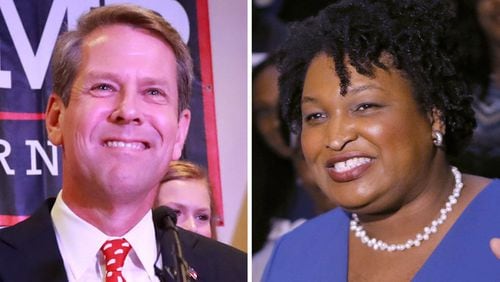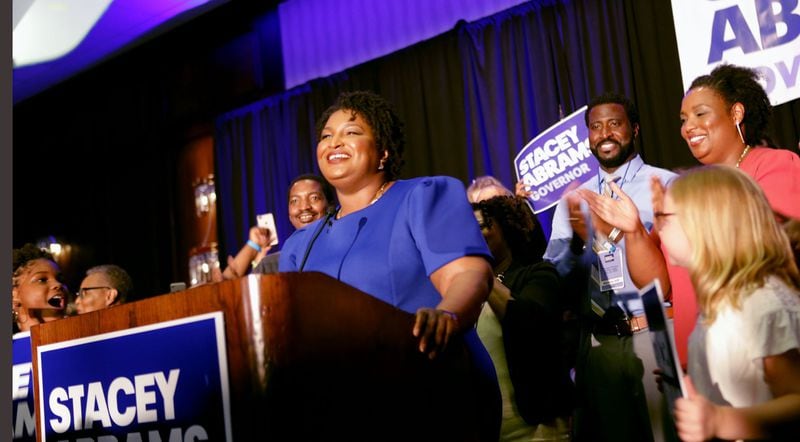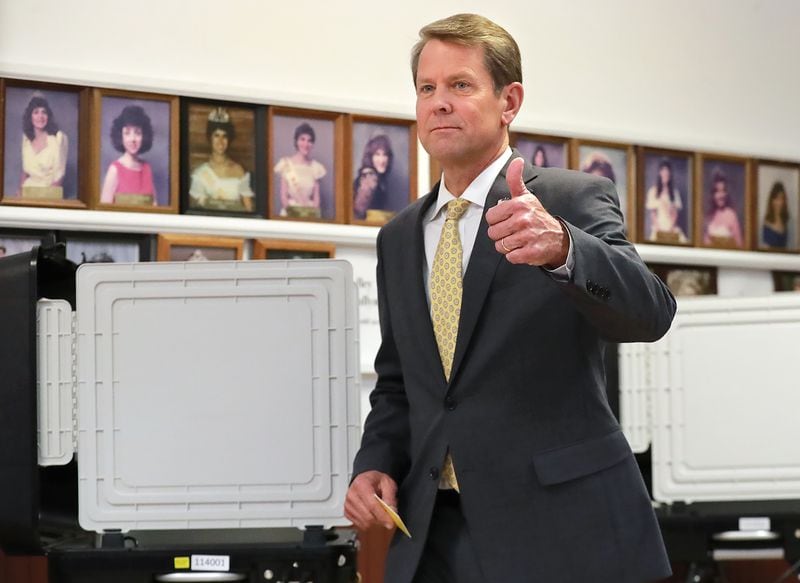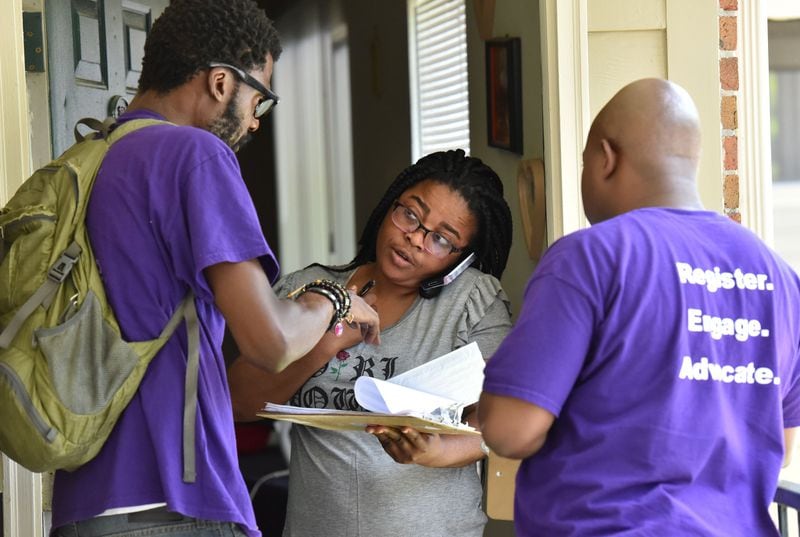As piles of voter registration forms flooded election offices in 2014, Georgia Secretary of State Brian Kemp launched a fraud investigation into Stacey Abrams' ambitious effort to boost minority voter turnout.
Neither could have known at the time it was the first blow struck in what would become an extensive battle to win voters in Georgia.
Long before they were political rivals in the race to become Georgia's next governor, Abrams and Kemp regularly clashed over voting rights.
Their four-year feud could determine the outcome of one of the nation’s most hard-fought gubernatorial campaigns.
Abrams, a Democrat, sought to vastly increase voter registrations among "the new American majority" of nonwhites, unmarried women and millennials — a group that she counts among her strongest supporters. Kemp, a Republican backed by President Donald Trump, said he prioritized registration accuracy and election security.
Abrams said Kemp is standing in the way of minority voters who are trying to participate in the democratic process.
“I have an opponent who is a remarkable architect of voter suppression,” Abrams said this month on “The Daily Show” on Comedy Central. “My mission is to tell folks, ‘He doesn’t matter, you do. Your right to vote is yours, and I’m going to give you a reason to use it.’ ”
Kemp said his record proves he has increased voting access.
The number of registered voters in Georgia increased from 5.8 million when he took office in 2010 to 6.7 million today. And Kemp started online voter registration, a mobile app and a Student Ambassador Program to encourage voter registration among voting-age high school students.
“My policies and my record are very clear that I have made it easier to vote,” Kemp said in an interview. “We have made the elections process more accessible to people in Georgia, not less, despite their rhetoric.”
Abrams was the Democrats' minority leader in the Georgia House when she founded the New Georgia Project in 2013 to sign up 800,000 people of color within a decade who weren't registered to vote.
While the New Georgia Project is a nonpartisan organization, the groups it targets consistently vote for Democrats. If the New Georgia Project meets its goal of signing up hundreds of thousands of minority voters, the balance of power in Georgia could swing from Republicans. So far, it has submitted a total of 250,000 registration applications.
When the New Georgia Project ramped up its voter registration drive before the 2014 election, it swamped local election officials with roughly 85,000 applications.
Credit: ccompton@ajc.com
Credit: ccompton@ajc.com
That quickly caught Kemp’s eye. He began looking into complaints of forged signatures and incomplete forms.
Just over half, about 46,000 of those applicants, were registered as active voters before the November general election that year.
Many applicants weren't added to voting rolls until their information was verified months later — after the election. About 18,000 applications were validated the next year. A total of 7,000 applications were canceled, 5,000 were duplicates and 10,000 couldn't be reconciled.
The New Georgia Project was required by law to turn in every registration form it gathered, even if it was incomplete.
Kemp's investigation eventually found no wrongdoing by the New Georgia Project, but he did find fault with its independent contractors who handled registration forms.
A total of 53 applications were allegedly forged. Seventeen contractors were referred to law enforcement for potential prosecution last year. None has been charged with a crime, and they denied submitting false documentation.
Civil rights leaders such as Democratic U.S. Rep. John Lewis criticized Kemp, saying he was making it difficult for Georgians to participate in the political process. Kemp at one point acknowledged the potential for Democrat-backed registration efforts to change the state's political landscape.
“Registering all these minority voters that are out there and others that are sitting on the sidelines, if they can do that, they can win these elections in November,” according to remarks Kemp made to Gwinnett County Republicans in 2014. Kemp urged Republicans to match those registration efforts.
Kemp said the New Georgia Project is to blame for voter registrations that weren’t processed in 2014.
Some registration forms were missing accurate street addresses or dates of birth. Others were submitted more than once. Signatures didn’t always match on duplicate registration forms.
“Applications we received from these canvassers were difficult to process, missing critical information, (and) contained duplicate registration submitted within days of each other,” Muscogee County Elections Director Nancy Boren said Sept. 20 in testimony to the State Election Board. “Often it was five or more applications dated one or two days apart.”
Kemp's strict "exact match" policy also held up registrations.
The policy required voter registration information to match driver’s license, state ID card or Social Security records. Mismatched voter registrations were put on “pending” status until voters verified their information.
Kemp settled a lawsuit last year so that the state would no longer reject applications that didn't exactly match personal identification information, an issue that affected 34,874 registration applications from 2013 to 2016. The Georgia General Assembly quickly reinstated "exact match" for voter registrations by passing it into state law last year.
The New Georgia Project’s executive director, Nse Ufot, said Kemp is responsible for seeking voter ID laws, purges of inactive voters, “exact match” procedures and shorter voter registration deadlines.
“So no, the laws of Georgia have not made it easy to register new voters and move them to the polls,” Ufot said. “Voting groups like ours have repeatedly had to sue Brian Kemp’s office to enforce the NVRA (National Voter Registration Act) and existing state and federal laws.”
A lawsuit threat last month from the Lawyers Committee for Civil Rights Under Law alleged that the “exact match” system has a negative impact on African-American, Latino and Asian-American voters.
For example, registrations were put on hold because of hyphens in their names, because the last four digits of their Social Security numbers matched a different person, or even because their status as U.S. citizens hadn’t been updated in state computers, said Julie Houk, senior special counsel for the Lawyers Committee, which fights inequitable treatment of African-Americans and other racial minorities.
“Whether this was an intentional decision to discriminate against minorities, I can’t say that for certain, but there is circumstantial evidence: It became known that large numbers of minorities were not getting out to the polls because of exact match,” Houk said.
Abrams didn’t comment for this article, and her spokeswoman issued a broad statement that didn’t address Kemp’s record on voter registrations.
“He cannot be trusted in any position of power,” Abrams spokeswoman Priyanka Mantha said.
Kemp spokeswoman Candice Broce said in a May email that election officials did their best to accommodate the New Georgia Project, working long hours to process their applications and informing them of the need for legible, complete registration forms. But the New Georgia Project “prioritized volume of applications over quality,” she said.
“If these problems continue, it is because the New Georgia Project remains uniquely sloppy in their registration efforts,” Broce said.
The New Georgia Project has said its error rates are lower than most other registration drives nationwide.
Election officials weren’t suppressing votes, Gwinnett County Elections Director Lynn Ledford said. They were doing their jobs by trying to help people register, sending them letters to seek verification of registration information, and rejecting applications as required by state law.
“It was frustrating to us because it was frustrating to the voters,” Ledford said. “Oftentimes we would get complaints from voters who would say, ‘We’re already registered, and why are you sending us these forms?’ We’d have to explain that wasn’t our form. That was from the New Georgia Project.”
Complaints about the New Georgia Project have subsided since 2014, Ledford said.
This year, Ufot said, her organization has helped 25,000 Georgians turn in registration forms. The group’s goal is to enroll an additional 75,000 voters before this year’s Oct. 9 voter registration deadline.
Voter registration and turnout will continue to be a key battleground for both Abrams and Kemp this fall. Both will attempt to galvanize their supporters and then turn their enthusiasm into votes.
African-American voters, the largest group sought by the New Georgia Project, overwhelmingly vote for Democratic candidates, and they've made historic gains in Georgia over the past four midterm elections, according to an analysis in May by The Atlanta Journal-Constitution. African-American voters made up more than 30 percent of the state's active registered voters in the last midterm election in 2014, an increase from 26 percent in 2006.
But Democratic candidates have consistently remained below the majority needed to win elections in Georgia.
Democratic candidates for president received between 45 percent and 47 percent of the vote in each of the past three presidential elections, as well as in the 2014 governor’s election between Republican Gov. Nathan Deal and Democrat Jason Carter.
Republican consultant Dan McLagan said he’s skeptical that Abrams’ voter registration efforts will change the outcome of the election.
“You hear the same argument every election cycle. It’s basically a concession that you don’t have enough support in the state to win, so you have to go find some new people,” McLagan said. “Stacey hasn’t been terribly effective at doing that in the past. I don’t see what separates this time from last time.”
OUR REPORTING
It’s a busy election year, and The Atlanta Journal-Constitution is keeping the spotlight on the leading candidates for governor, Republican Brian Kemp and Democrat Stacey Abrams. Stories we’ve done include a look at Kemp’s fundraising among industries he regulates and Abrams’ tax difficulties. Look for more at ajc.com/politics as the state heads for the general election on Nov. 6.
The story so far
Before the 2014 election, Democrat Stacey Abrams launched the New Georgia Project, an organization focused on registering racial minorities and others to vote. Republican Brian Kemp started an investigation after hearing complaints of suspicious registration applications.
Last year, the investigation concluded that 53 applications were allegedly forged by independent contracts, and investigators found no wrongdoing by the New Georgia Project.
Now, voting rights and registrations are an issue in the heated race for governor between Kemp and Abrams.











